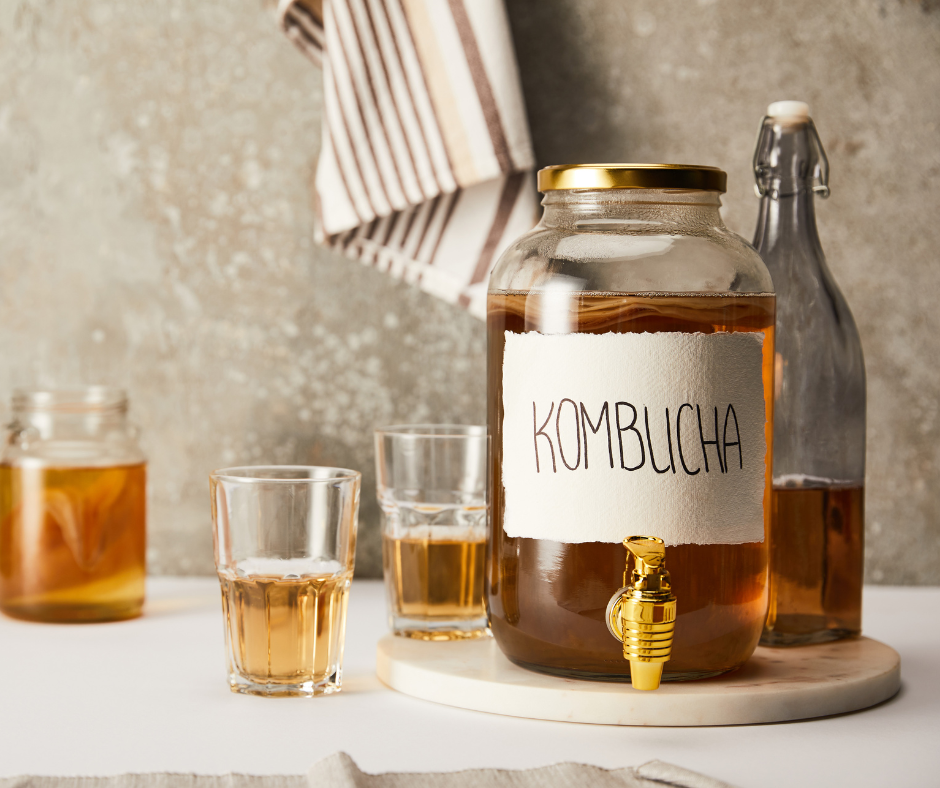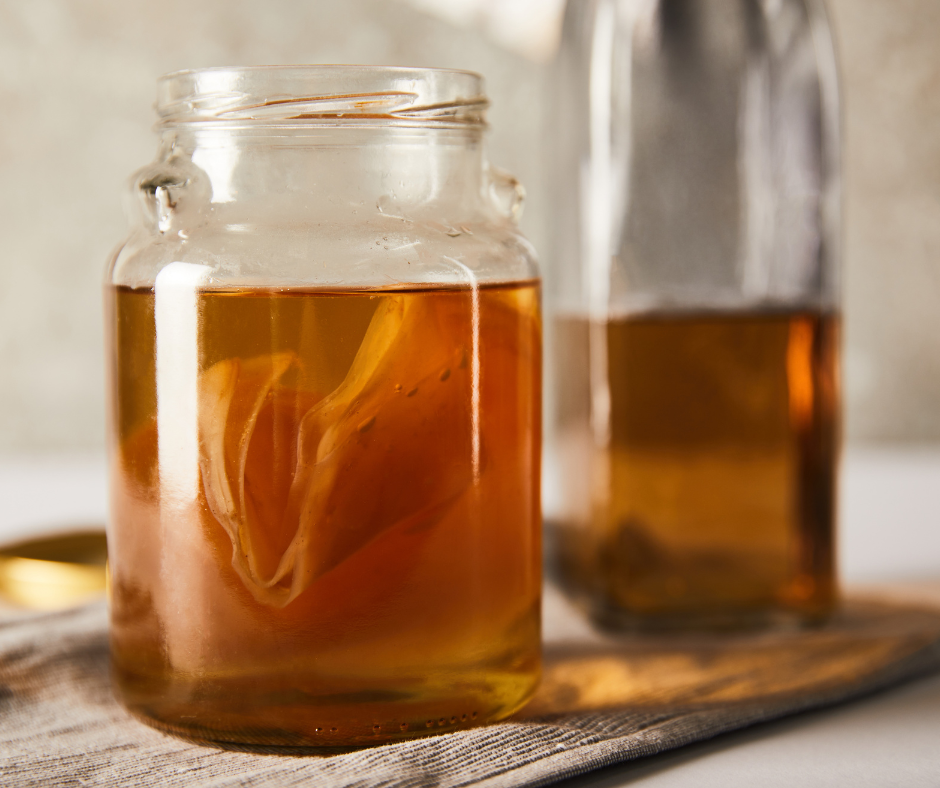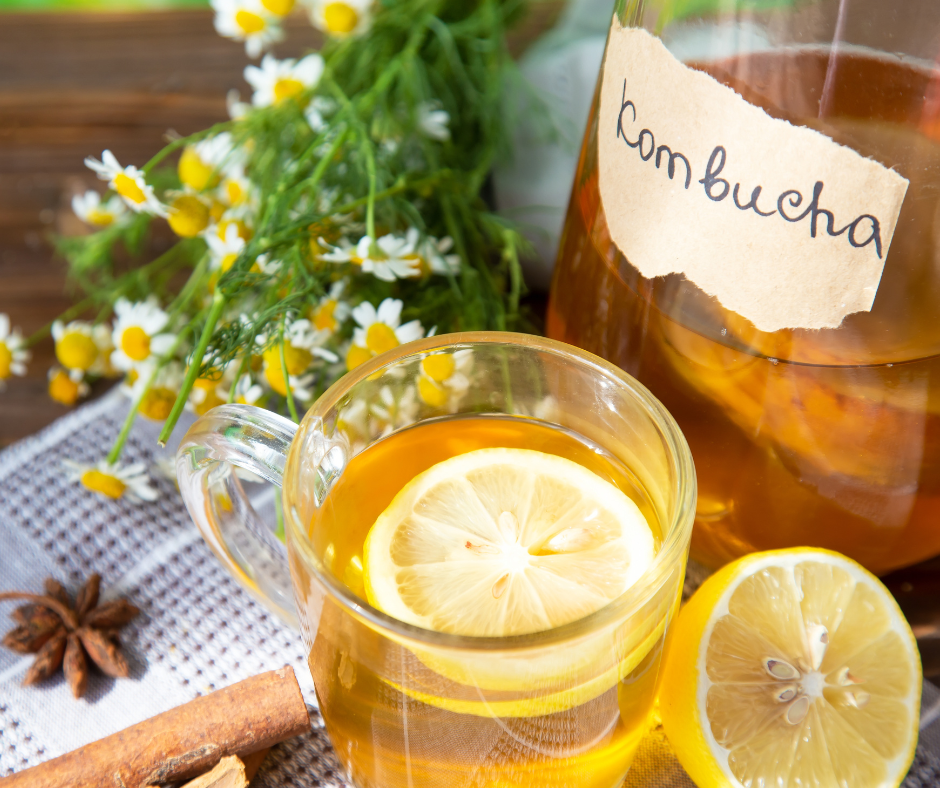Introduction
Kombucha has recently gained significant popularity as a trendy, health-conscious beverage. With claims of various health benefits, many people are curious about its ingredients, particularly caffeine. Let’s delve into the question: Does kombucha have caffeine? And what are the implications for those sensitive to or avoiding caffeine?
The Popularity Of Kombucha And Its Health Claims
Kombucha is a fermented tea drink consumed for centuries due to its potential health benefits. It is made through the fermentation of brewed tea with a symbiotic culture of bacteria and yeast (SCOBY). This fermentation process converts sugars into organic acids, carbon dioxide, and small amounts of alcohol. Kombucha is often touted for its probiotic content, which can help support a healthy gut and digestive system.
Question: Does Kombucha Have Caffeine?
So, Does Kombucha Have Caffeine? In short, yes, kombucha contains some caffeine. Since kombucha is typically made from brewed tea, which naturally contains caffeine, a small amount remains in the finished product. The caffeine can vary depending on factors such as the type of tea used and the fermentation process. However, the caffeine content in kombucha is generally much lower than a regular cup of tea or coffee.
It’s important to note that the caffeine content in kombucha can still have mild stimulant effects. While these effects are significantly milder than coffee or energy drinks, individuals sensitive to caffeine or following a caffeine-restricted diet may want to consume kombucha in moderation or opt for caffeine-free varieties.
Brief Answer: Yes, Kombucha Contains Some Caffeine
Although kombucha does contain some caffeine, it’s important to remember that the caffeine content is relatively low. Most commercially available kombucha brands have less than 20 milligrams of caffeine per serving, while a typical cup of coffee can contain around 95 milligrams. This makes kombucha suitable for those who want to reduce their caffeine intake without eliminating it.
Additionally, caffeine-free varieties of kombucha are available on the market for individuals who prefer to avoid caffeine altogether. These options are made with herbal teas or other caffeine-free ingredients, providing a non-caffeinated alternative while enjoying kombucha’s potential health benefits.
In conclusion, although kombucha contains some caffeine, the amount is significantly lower than other caffeinated beverages. Individuals sensitive to caffeine can still enjoy kombucha in moderation or opt for caffeine-free varieties. It’s always advisable to check the label or consult with the manufacturer if caffeine content concerns you.
So, next time you reach for a bottle of kombucha, you can make an informed decision about the caffeine content while enjoying its potential health benefits.
Understanding Kombucha’s Caffeine Content
Caffeine’s Presence In Tea And Its Impact On Kombucha
Kombucha, a fermented and slightly effervescent tea drink, has gained popularity recently for its potential health benefits. One question that often arises is ‘Does Kombucha Have Caffeine?’ considering it is made from tea. The answer is yes. Tea, the main ingredient in kombucha, naturally contains caffeine. The caffeine content in kombucha can vary depending on the tea used during fermentation.
How Much Caffeine Is In Kombucha?
The caffeine content in kombucha can vary depending on various factors, including the type and strength of the tea used, the fermentation process, and the brewing time. On average, a standard 8-ounce kombucha contains about 15-30 milligrams of caffeine. This is significantly less than a cup of coffee, typically containing 95 milligrams of caffeine per 8-ounce serving. Therefore, kombucha can be a suitable option if you are looking for a lower-caffeine alternative to coffee or other caffeinated beverages.
Exploring The Effects Of Caffeine In Kombucha
The effects of caffeine in kombucha can vary depending on an individual’s caffeine sensitivity. While kombucha contains lower caffeine levels than coffee, it can still provide a mild energy boost. Some individuals may experience increased focus, alertness, and a slight metabolic boost after consuming kombucha.
However, it is important to note that the caffeine in kombucha is still present and can have potential side effects if consumed in excess. Individuals sensitive to caffeine or have certain health conditions, such as pregnancy, heart problems, or anxiety disorders, should exercise caution when consuming kombucha or any other caffeinated beverage.
It is advisable to read the labels or consult the manufacturer to determine the exact caffeine content in specific kombucha brands, as it can vary. Some brands may also offer caffeine-free or low-caffeine options for those who prefer to avoid or limit caffeine intake.
In conclusion, kombucha contains caffeine, but the amount can vary depending on the tea used and the brewing process. While kombucha can provide a mild energy boost, it generally contains less caffeine than coffee and other caffeinated beverages. When consuming kombucha or any other caffeinated beverage, it is important to consider personal caffeine sensitivity and potential health conditions.
Decaffeinated Kombucha Options
For kombucha lovers with caffeine sensitivity or those looking for a caffeine-free alternative, it is important to understand the caffeine content in kombucha and explore decaffeinated options.
Caffeine Sensitivity And Alternatives For Kombucha Lovers
Caffeine sensitivity can vary from person to person. Some individuals may experience negative effects after consuming caffeinated beverages, such as insomnia, nervousness, or jitters. Alternatives are available for those with caffeine sensitivity or seeking to reduce their caffeine intake.
Low-caffeinated And Decaffeinated Tea Choices For Kombucha
The kombucha base is typically made from tea, which naturally contains caffeine. However, you can choose low-caffeinated or decaffeinated teas to brew your kombucha. Green and white tea are popular for kombucha brewing and have a lower caffeine content than black tea. These teas still provide the nutrients and flavor for your kombucha while reducing caffeine intake.
Fujian Oolong Tea: A Popular Option For Making Caffeine-free Kombucha
Fujian Oolong tea is a highly regarded option for making caffeine-free kombucha. This type of tea goes through partial fermentation, resulting in a uniquely smooth flavor and lower caffeine content. By using Fujian Oolong tea as the base for your kombucha, you can enjoy all the health benefits and flavors without the stimulating effects of caffeine.
In addition to choosing decaffeinated teas, it is important to note that the fermentation process in kombucha can further reduce the caffeine content. During fermentation, the bacteria and yeast cultures consume a portion of the caffeine present in the tea, resulting in a lower caffeine content in the final product. However, the amount of caffeine reduction can vary depending on factors such as brewing time and temperature.
When selecting decaffeinated kombucha, it’s essential to read the label or consult the manufacturer to ensure that the caffeine content meets your requirements. Some brands offer specific decaffeinated kombucha options made using teas with minimal or no caffeine.
In conclusion, for those with caffeine sensitivity or individuals looking for a caffeine-free alternative, decaffeinated options are available for kombucha lovers. Choosing low-caffeinated or decaffeinated teas as the base for your kombucha, such as green tea, white tea, or Fujian Oolong tea, can help reduce the caffeine content. Additionally, the fermentation process in kombucha further lowers the caffeine levels. By exploring decaffeinated kombucha options, you can continue to enjoy the health benefits and flavors of this popular probiotic beverage without the stimulating effects of caffeine.
Caffeine In Kombucha Vs. Coffee And Tea
Distinctions Between Caffeine In Tea And Caffeine In Coffee
Kombucha has recently become a healthy and flavorful alternative to sugary beverages. One key question when discussing kombucha is ‘Does Kombucha Have Caffeine?’. While tea and coffee are known for their caffeine content, the caffeine levels in kombucha can vary.
Tea, which is the base ingredient of kombucha, naturally contains caffeine. However, the fermentation process converts some of the caffeine into other compounds. As a result, the caffeine content in kombucha is relatively low compared to that in tea. On the other hand, coffee has significantly higher caffeine levels than tea, making it a popular choice for those seeking an energy boost.
Comparing The Energy-boosting Effects Of Coffee And The Relaxing Effects Of Tea
Coffee is well known for its ability to provide a quick energy boost. The high caffeine stimulates the nervous system, enhancing alertness, focus, and physical performance. However, the effects of coffee can also include jitters, anxiety, and difficulty sleeping when consumed in excess.
In contrast, tea is often regarded as a soothing beverage. Although it contains less caffeine than coffee, it still provides a gentle pick-me-up. The lower caffeine levels in tea allow for a more gradual release of energy, promoting relaxation and mental clarity.
Kombucha’s lower caffeine content offers a milder energy boost than coffee. The fermentation process adds probiotics and beneficial organic acids, contributing to its unique flavor and potential health benefits.
The Health Benefits Of Kombucha Beyond Caffeine Content
While the caffeine content in kombucha may be lower than in coffee and tea, it is worth noting that it offers numerous other health benefits. The fermentation process of kombucha results in the formation of beneficial compounds such as vitamins, minerals, organic acids, and antioxidants.
These compounds have been found to support digestive health, boost the immune system, and improve gut microbiota. Kombucha is also believed to have detoxifying properties, promoting liver function and aiding in removing harmful substances from the body.
Additionally, kombucha is a source of probiotics, which are beneficial bacteria that support gut health and overall well-being. Probiotics have been linked to improved digestion, enhanced immune function, and even mental health benefits.
In conclusion, while kombucha contains trace amounts of caffeine due to its base ingredient, tea, the caffeine levels are generally lower than coffee and tea. The energy-boosting effects of kombucha are milder, making it a suitable choice for those looking for a gentle pick-me-up without the potential side effects of excessive caffeine consumption. Moreover, kombucha offers a range of health benefits beyond caffeine, thanks to its fermentation process and probiotic content. So, whether you choose kombucha for its taste or potential health benefits, it can be a refreshing addition to your daily routine.
FAQ: Does Kombucha Have Caffeine? – Demystifying Kombucha: Caffeine Content and Health Benefits
Q: Does kombucha contain caffeine?
A: Yes, kombucha does contain caffeine, but the amount is generally considered to be lower than in other caffeinated beverages.
Q: Is kombucha a good alternative to other caffeinated drinks?
A: Yes, kombucha can be a great alternative for those who want the energy-boosting effects of caffeine without the potential health risks associated with higher caffeine intake.
Q: What are the health benefits of kombucha?
A: Kombucha is a fermented tea beverage that is rich in beneficial probiotics, which can help improve digestive health and overall immunity. It also contains vitamins, minerals, and antioxidants that can boost energy levels, improve digestion, and reduce inflammation.
Q: Can kombucha improve mental health?
A: While kombucha is not a direct solution for mental health issues, it can contribute to overall wellness by supporting digestive health and providing B vitamins that can help boost energy and mood.
Q: Are there different types of kombucha?
A: Yes, there are various types of kombucha available. The main difference lies in the flavor, but some kombuchas may contain additional natural ingredients such as fruits or herbs.
Q: Should caffeine intake be considered when consuming kombucha?
A: Yes, it is important to be mindful of your caffeine intake, considering personal needs and lifestyle factors. If you are sensitive to caffeine or trying to limit your intake, be aware that kombucha contains trace amounts of caffeine.
Q: What are the potential risks of caffeine consumption?
A: Excessive caffeine consumption can lead to side effects such as restlessness, increased heart rate, anxiety, and trouble sleeping. It is important to consume caffeine in moderation and be aware of your own tolerance levels.
Q: Can kombucha be beneficial for digestion?
A: Yes, kombucha is known for its probiotics, which can help support gut health and improve digestion. It may also have anti-inflammatory effects due to its antioxidant content.
Q: Can kombucha provide an energy boost?
A: Yes, kombucha contains B vitamins that can help boost energy levels. While the caffeine content in kombucha is lower than in other beverages, it may still provide a mild energy boost.
Q: Is kombucha suitable for everyone?
A: Kombucha is generally safe for most people to consume, but individual tolerances and sensitivities may vary. If you have any pre-existing health conditions or concerns, it is advisable to consult with a healthcare professional before adding kombucha to your diet.
Q: How can I incorporate kombucha into my diet?
A: Kombucha can be enjoyed as a refreshing beverage on its own or used as a base for smoothies and cocktails. It is important to read labels and choose kombuchas with lower sugar content if you are watching your sugar intake.
Conclusion
Now you should know the answer to ‘Does Kombucha Have Caffeine?’. Kombucha does contain caffeine, but the levels can vary depending on the fermentation process and the type of tea used. It generally has lower caffeine levels than other caffeinated beverages like coffee or traditional tea. However, if you are sensitive to caffeine or trying to limit your intake, you must be mindful of how much kombucha you consume.
Recap Of Kombucha’s Caffeine Content And Effects
Kombucha is a fermented tea that naturally contains a small amount of caffeine. The caffeine content in kombucha can range from 15-30 mg per 8 oz serving, significantly lower than a cup of coffee. While the caffeine content in kombucha is relatively low, it can still stimulate the body, providing a gentle and sustained energy boost.
Emphasizing The Importance Of Personal Caffeine Sensitivity
It’s important to note that everyone’s caffeine sensitivity is different. Some individuals may be more sensitive to caffeine and experience adverse effects like jitters, increased heart rate, or difficulty sleeping even with small amounts of caffeine. If you are sensitive to caffeine or have any underlying health conditions, it’s always best to consult a healthcare professional before incorporating kombucha into your diet.
Overall Health Benefits Of Kombucha Beyond Its Caffeine Content
While caffeine is a factor to consider, kombucha offers numerous health benefits beyond its caffeine content. It is a rich source of probiotics, beneficial bacteria supporting a healthy digestive system. Kombucha also contains antioxidants, organic acids, and enzymes supporting immune function, detoxification, and overall well-being.
Additionally, kombucha is popular for individuals looking for a refreshing, low-sugar alternative to sugary beverages. It can be a great option for those who are trying to reduce their intake of soda or other sweetened drinks.
It’s important to remember that kombucha is not a cure-all and should be consumed as part of a balanced diet. As with any dietary change or addition, it’s always a good idea to listen to your body’s response and adjust based on your needs.
Overall, kombucha can be a great addition to a healthy lifestyle, providing a refreshing and flavorful beverage with potential health benefits. Just be aware of the caffeine content and how it may affect you personally.

Deb Carlson at Crosslake Coffee: Join Deb at Crosslake Coffee for a delightful blend of community, caffeine, and creativity. Discover the cozy ambiance and warm hospitality that make this local coffee shop a beloved gathering spot. From expertly crafted espresso drinks to mouthwatering pastries, Deb invites you to savor every sip and bite. Stay connected with the latest updates on specials, events, and live music performances by following Deb Carlson at Crosslake Coffee on social media. Embrace the vibrant online community and share your love for great coffee and good company with fellow enthusiasts. Don’t miss out on a moment of the Crosslake Coffee experience – connect with Deb on social media today.



